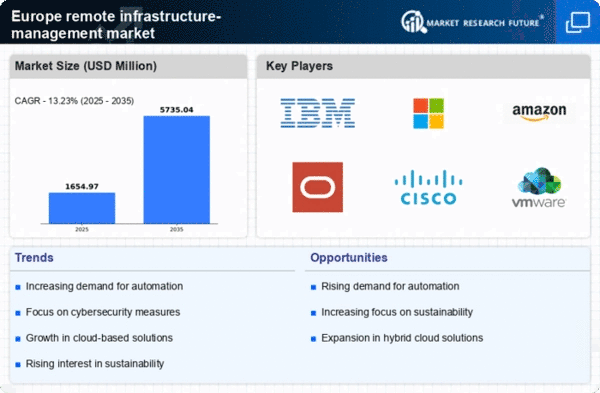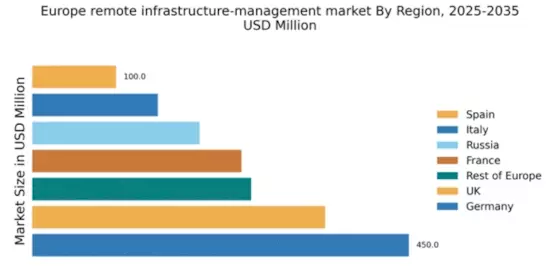Germany : Strong Infrastructure and Innovation Hub
Germany holds a dominant position in the European remote infrastructure-management market, with a market value of $450.0 million, representing approximately 30% of the total market share. Key growth drivers include a robust industrial base, increasing demand for cloud services, and government initiatives promoting digital transformation. Regulatory policies favoring data protection and cybersecurity are also pivotal, alongside significant investments in infrastructure development across various sectors.
UK : Innovation and Investment Drive Market
The UK market for remote infrastructure management is valued at $350.0 million, accounting for about 23% of the European market. Growth is fueled by a surge in remote work, increased cloud adoption, and a focus on cybersecurity. The UK government has introduced policies to support tech innovation, while the financial services sector drives demand for reliable infrastructure management solutions, reflecting a shift towards digital-first strategies.
France : Strong Demand in Tech Sectors
France's remote infrastructure-management market is valued at $250.0 million, representing roughly 17% of the European market. Growth is driven by the digitalization of industries, particularly in technology and telecommunications. Government initiatives, such as the France 2030 plan, aim to bolster digital infrastructure and innovation. The increasing need for data security and compliance with EU regulations also shapes market dynamics.
Russia : Focus on Local Solutions and Security
Russia's market for remote infrastructure management is valued at $200.0 million, making up about 13% of the European market. Key growth drivers include a push for local data centers and increased investment in cybersecurity. Regulatory frameworks are evolving to support domestic technology solutions, while demand is rising in sectors like energy and telecommunications, which are critical for national security and economic stability.
Italy : Infrastructure Development and Innovation
Italy's remote infrastructure-management market is valued at $150.0 million, representing about 10% of the European market. Growth is supported by government initiatives aimed at enhancing digital infrastructure and promoting innovation in SMEs. The demand for remote management solutions is particularly strong in manufacturing and retail sectors, driven by the need for operational efficiency and cost reduction.
Spain : Digital Transformation in Progress
Spain's market for remote infrastructure management is valued at $100.0 million, accounting for approximately 7% of the European market. The growth is propelled by increasing cloud adoption and digital transformation initiatives across various sectors. Government policies are focused on enhancing digital skills and infrastructure, while the tourism and hospitality sectors are increasingly relying on remote management solutions to optimize operations.
Rest of Europe : Varied Growth Across Sub-regions
The Rest of Europe market for remote infrastructure management is valued at $261.6 million, representing about 17% of the total market. Growth varies significantly across countries, driven by local demand for digital solutions and infrastructure improvements. Regulatory environments differ, influencing market dynamics, while sectors like healthcare and education are increasingly adopting remote management solutions to enhance service delivery and efficiency.

















